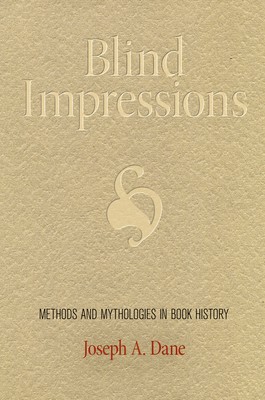
- We will send in 10–14 business days.
- Author: Joseph a Dane
- Publisher: University of Pennsylvania Press
- ISBN-10: 0812245490
- ISBN-13: 9780812245493
- Format: 15.5 x 23.1 x 2.5 cm, kieti viršeliai
- Language: English
- SAVE -10% with code: EXTRA
Reviews
Description
As bibliographers or book historians, we perform our work by changing the function of the objects we study. We rarely pick up an Aldine edition to read one of the classical texts it contains. . . . Print culture, under this notion, is not a medium for writing or thought but a historical object of study; our bibliographical field, our own concoction, becomes the true referent of the objects we define as its foundation.--From the Introduction
What is a book in the study of print culture? For the scholar of material texts, it is not only a singular copy carrying the unique traces of printing and preservation efforts, or an edition, repeated and repeatable, or a vehicle for ideas to be abstracted from the physical copy. But when the bibliographer situates a book copy within the methods of book history, Joseph A. Dane contends, it is the known set of assumptions which govern the discipline that bibliographic arguments privilege, repeat, or challenge. Book history, he writes, is us. In Blind Impressions, Dane reexamines the field of material book history by questioning its most basic assumptions and definitions. How is print defined? What are the limits of printing history? What constitutes evidence? His concluding section takes form as a series of short studies in theme and variation, considering such matters as two-color printing, the composing stick used by hand-press printers, the bibliographical status of book fragments, and the function of scholarly illustration in the Digital Age. Meticulously detailed, deeply learned, and often contrarian, Blind Impressions is a bracing critique of the way scholars define and solve problems.EXTRA 10 % discount with code: EXTRA
The promotion ends in 22d.05:42:59
The discount code is valid when purchasing from 10 €. Discounts do not stack.
- Author: Joseph a Dane
- Publisher: University of Pennsylvania Press
- ISBN-10: 0812245490
- ISBN-13: 9780812245493
- Format: 15.5 x 23.1 x 2.5 cm, kieti viršeliai
- Language: English English
As bibliographers or book historians, we perform our work by changing the function of the objects we study. We rarely pick up an Aldine edition to read one of the classical texts it contains. . . . Print culture, under this notion, is not a medium for writing or thought but a historical object of study; our bibliographical field, our own concoction, becomes the true referent of the objects we define as its foundation.--From the Introduction
What is a book in the study of print culture? For the scholar of material texts, it is not only a singular copy carrying the unique traces of printing and preservation efforts, or an edition, repeated and repeatable, or a vehicle for ideas to be abstracted from the physical copy. But when the bibliographer situates a book copy within the methods of book history, Joseph A. Dane contends, it is the known set of assumptions which govern the discipline that bibliographic arguments privilege, repeat, or challenge. Book history, he writes, is us. In Blind Impressions, Dane reexamines the field of material book history by questioning its most basic assumptions and definitions. How is print defined? What are the limits of printing history? What constitutes evidence? His concluding section takes form as a series of short studies in theme and variation, considering such matters as two-color printing, the composing stick used by hand-press printers, the bibliographical status of book fragments, and the function of scholarly illustration in the Digital Age. Meticulously detailed, deeply learned, and often contrarian, Blind Impressions is a bracing critique of the way scholars define and solve problems.

Reviews